Negative Effects of Social Media Use on Subjective Well-being
VerifiedAdded on 2023/01/11
|8
|2163
|71
Literature Review
AI Summary
This literature review explores the negative impacts of social media usage on subjective well-being. The abstract highlights the contrasting effects of Facebook use, with maintaining existing relationships positively correlating with well-being, while creating new relationships negatively impacts it. The review delves into various studies, including cross-sectional, longitudinal, and experimental designs, examining how social media affects well-being. It differentiates between active and passive social media usage, with passive usage, like monitoring others' lives, being linked to decreased well-being. Studies by Kross et al. (2013) and Sagioglou and Greitemeyer (2014) are discussed, showing how Facebook usage can predict declines in subjective well-being. The review also references studies on gender differences, and how active engagement can sometimes increase well-being. The paper synthesizes findings from multiple sources, including research by Verduyn et al. (2017), Rae and Lonborg (2015), and Krasnova et al. (2015) to provide a comprehensive understanding of the complex relationship between social media and well-being. The paper concludes by discussing the implications of these findings and suggesting directions for future research.
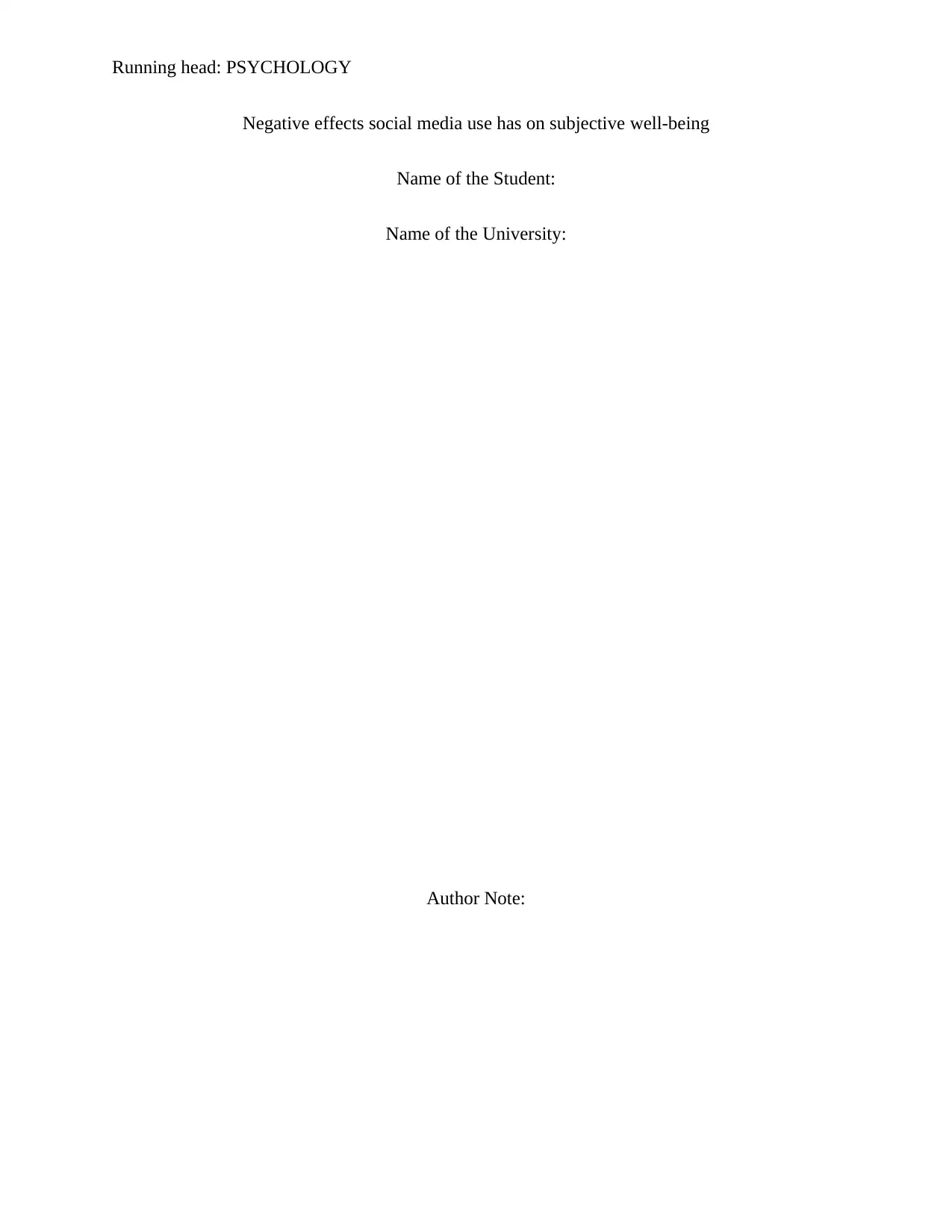
Running head: PSYCHOLOGY
Negative effects social media use has on subjective well-being
Name of the Student:
Name of the University:
Author Note:
Negative effects social media use has on subjective well-being
Name of the Student:
Name of the University:
Author Note:
Paraphrase This Document
Need a fresh take? Get an instant paraphrase of this document with our AI Paraphraser
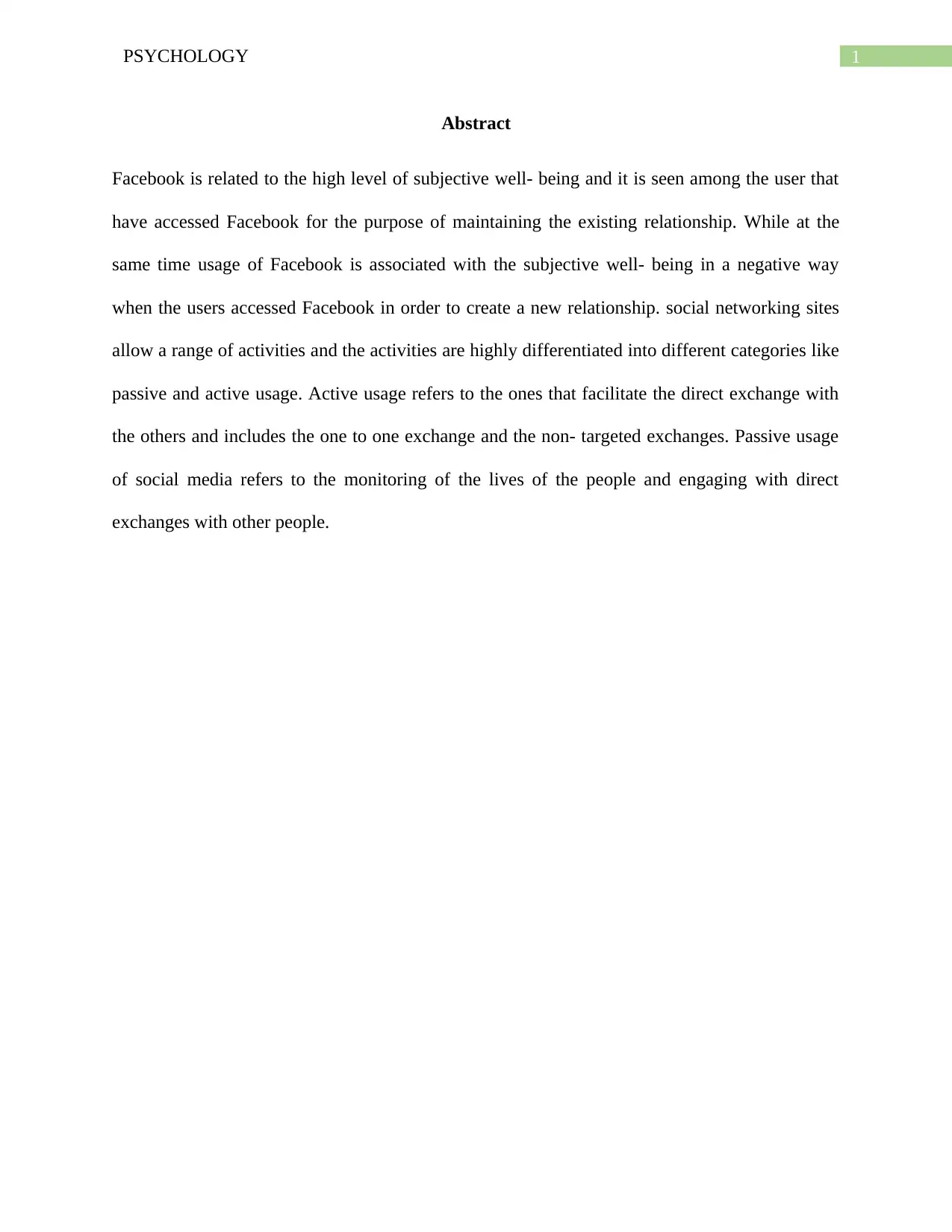
1PSYCHOLOGY
Abstract
Facebook is related to the high level of subjective well- being and it is seen among the user that
have accessed Facebook for the purpose of maintaining the existing relationship. While at the
same time usage of Facebook is associated with the subjective well- being in a negative way
when the users accessed Facebook in order to create a new relationship. social networking sites
allow a range of activities and the activities are highly differentiated into different categories like
passive and active usage. Active usage refers to the ones that facilitate the direct exchange with
the others and includes the one to one exchange and the non- targeted exchanges. Passive usage
of social media refers to the monitoring of the lives of the people and engaging with direct
exchanges with other people.
Abstract
Facebook is related to the high level of subjective well- being and it is seen among the user that
have accessed Facebook for the purpose of maintaining the existing relationship. While at the
same time usage of Facebook is associated with the subjective well- being in a negative way
when the users accessed Facebook in order to create a new relationship. social networking sites
allow a range of activities and the activities are highly differentiated into different categories like
passive and active usage. Active usage refers to the ones that facilitate the direct exchange with
the others and includes the one to one exchange and the non- targeted exchanges. Passive usage
of social media refers to the monitoring of the lives of the people and engaging with direct
exchanges with other people.
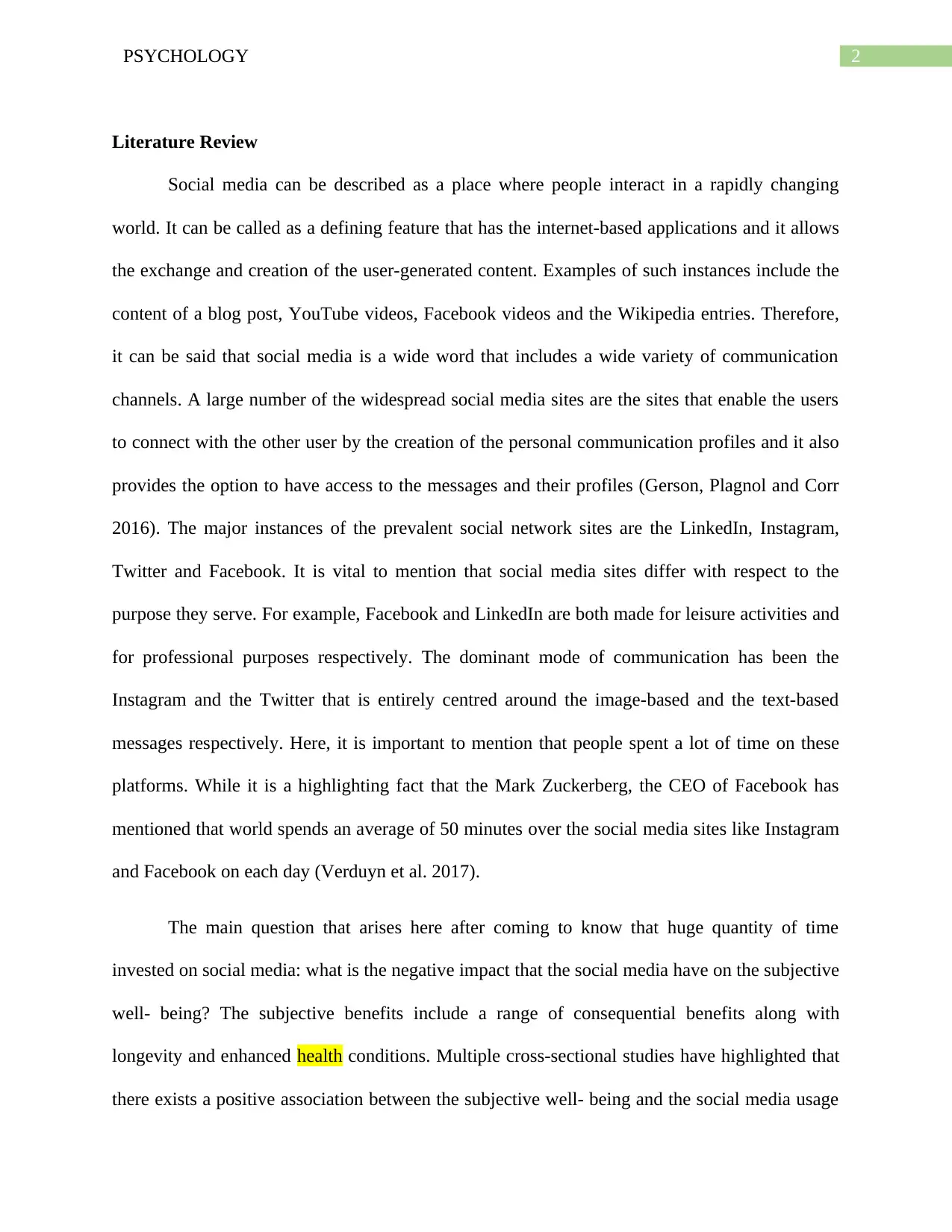
2PSYCHOLOGY
Literature Review
Social media can be described as a place where people interact in a rapidly changing
world. It can be called as a defining feature that has the internet-based applications and it allows
the exchange and creation of the user-generated content. Examples of such instances include the
content of a blog post, YouTube videos, Facebook videos and the Wikipedia entries. Therefore,
it can be said that social media is a wide word that includes a wide variety of communication
channels. A large number of the widespread social media sites are the sites that enable the users
to connect with the other user by the creation of the personal communication profiles and it also
provides the option to have access to the messages and their profiles (Gerson, Plagnol and Corr
2016). The major instances of the prevalent social network sites are the LinkedIn, Instagram,
Twitter and Facebook. It is vital to mention that social media sites differ with respect to the
purpose they serve. For example, Facebook and LinkedIn are both made for leisure activities and
for professional purposes respectively. The dominant mode of communication has been the
Instagram and the Twitter that is entirely centred around the image-based and the text-based
messages respectively. Here, it is important to mention that people spent a lot of time on these
platforms. While it is a highlighting fact that the Mark Zuckerberg, the CEO of Facebook has
mentioned that world spends an average of 50 minutes over the social media sites like Instagram
and Facebook on each day (Verduyn et al. 2017).
The main question that arises here after coming to know that huge quantity of time
invested on social media: what is the negative impact that the social media have on the subjective
well- being? The subjective benefits include a range of consequential benefits along with
longevity and enhanced health conditions. Multiple cross-sectional studies have highlighted that
there exists a positive association between the subjective well- being and the social media usage
Literature Review
Social media can be described as a place where people interact in a rapidly changing
world. It can be called as a defining feature that has the internet-based applications and it allows
the exchange and creation of the user-generated content. Examples of such instances include the
content of a blog post, YouTube videos, Facebook videos and the Wikipedia entries. Therefore,
it can be said that social media is a wide word that includes a wide variety of communication
channels. A large number of the widespread social media sites are the sites that enable the users
to connect with the other user by the creation of the personal communication profiles and it also
provides the option to have access to the messages and their profiles (Gerson, Plagnol and Corr
2016). The major instances of the prevalent social network sites are the LinkedIn, Instagram,
Twitter and Facebook. It is vital to mention that social media sites differ with respect to the
purpose they serve. For example, Facebook and LinkedIn are both made for leisure activities and
for professional purposes respectively. The dominant mode of communication has been the
Instagram and the Twitter that is entirely centred around the image-based and the text-based
messages respectively. Here, it is important to mention that people spent a lot of time on these
platforms. While it is a highlighting fact that the Mark Zuckerberg, the CEO of Facebook has
mentioned that world spends an average of 50 minutes over the social media sites like Instagram
and Facebook on each day (Verduyn et al. 2017).
The main question that arises here after coming to know that huge quantity of time
invested on social media: what is the negative impact that the social media have on the subjective
well- being? The subjective benefits include a range of consequential benefits along with
longevity and enhanced health conditions. Multiple cross-sectional studies have highlighted that
there exists a positive association between the subjective well- being and the social media usage
⊘ This is a preview!⊘
Do you want full access?
Subscribe today to unlock all pages.

Trusted by 1+ million students worldwide
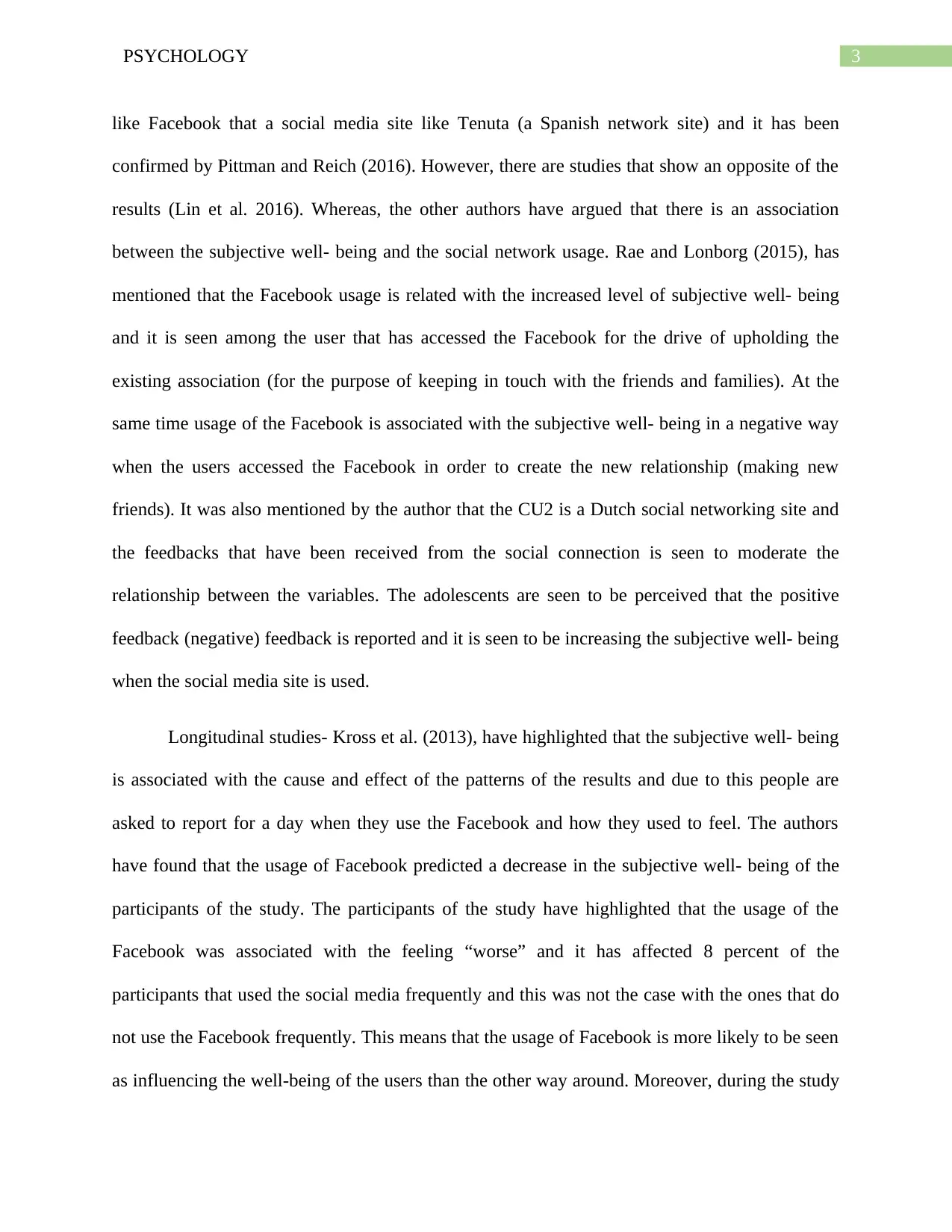
3PSYCHOLOGY
like Facebook that a social media site like Tenuta (a Spanish network site) and it has been
confirmed by Pittman and Reich (2016). However, there are studies that show an opposite of the
results (Lin et al. 2016). Whereas, the other authors have argued that there is an association
between the subjective well- being and the social network usage. Rae and Lonborg (2015), has
mentioned that the Facebook usage is related with the increased level of subjective well- being
and it is seen among the user that has accessed the Facebook for the drive of upholding the
existing association (for the purpose of keeping in touch with the friends and families). At the
same time usage of the Facebook is associated with the subjective well- being in a negative way
when the users accessed the Facebook in order to create the new relationship (making new
friends). It was also mentioned by the author that the CU2 is a Dutch social networking site and
the feedbacks that have been received from the social connection is seen to moderate the
relationship between the variables. The adolescents are seen to be perceived that the positive
feedback (negative) feedback is reported and it is seen to be increasing the subjective well- being
when the social media site is used.
Longitudinal studies- Kross et al. (2013), have highlighted that the subjective well- being
is associated with the cause and effect of the patterns of the results and due to this people are
asked to report for a day when they use the Facebook and how they used to feel. The authors
have found that the usage of Facebook predicted a decrease in the subjective well- being of the
participants of the study. The participants of the study have highlighted that the usage of the
Facebook was associated with the feeling “worse” and it has affected 8 percent of the
participants that used the social media frequently and this was not the case with the ones that do
not use the Facebook frequently. This means that the usage of Facebook is more likely to be seen
as influencing the well-being of the users than the other way around. Moreover, during the study
like Facebook that a social media site like Tenuta (a Spanish network site) and it has been
confirmed by Pittman and Reich (2016). However, there are studies that show an opposite of the
results (Lin et al. 2016). Whereas, the other authors have argued that there is an association
between the subjective well- being and the social network usage. Rae and Lonborg (2015), has
mentioned that the Facebook usage is related with the increased level of subjective well- being
and it is seen among the user that has accessed the Facebook for the drive of upholding the
existing association (for the purpose of keeping in touch with the friends and families). At the
same time usage of the Facebook is associated with the subjective well- being in a negative way
when the users accessed the Facebook in order to create the new relationship (making new
friends). It was also mentioned by the author that the CU2 is a Dutch social networking site and
the feedbacks that have been received from the social connection is seen to moderate the
relationship between the variables. The adolescents are seen to be perceived that the positive
feedback (negative) feedback is reported and it is seen to be increasing the subjective well- being
when the social media site is used.
Longitudinal studies- Kross et al. (2013), have highlighted that the subjective well- being
is associated with the cause and effect of the patterns of the results and due to this people are
asked to report for a day when they use the Facebook and how they used to feel. The authors
have found that the usage of Facebook predicted a decrease in the subjective well- being of the
participants of the study. The participants of the study have highlighted that the usage of the
Facebook was associated with the feeling “worse” and it has affected 8 percent of the
participants that used the social media frequently and this was not the case with the ones that do
not use the Facebook frequently. This means that the usage of Facebook is more likely to be seen
as influencing the well-being of the users than the other way around. Moreover, during the study
Paraphrase This Document
Need a fresh take? Get an instant paraphrase of this document with our AI Paraphraser
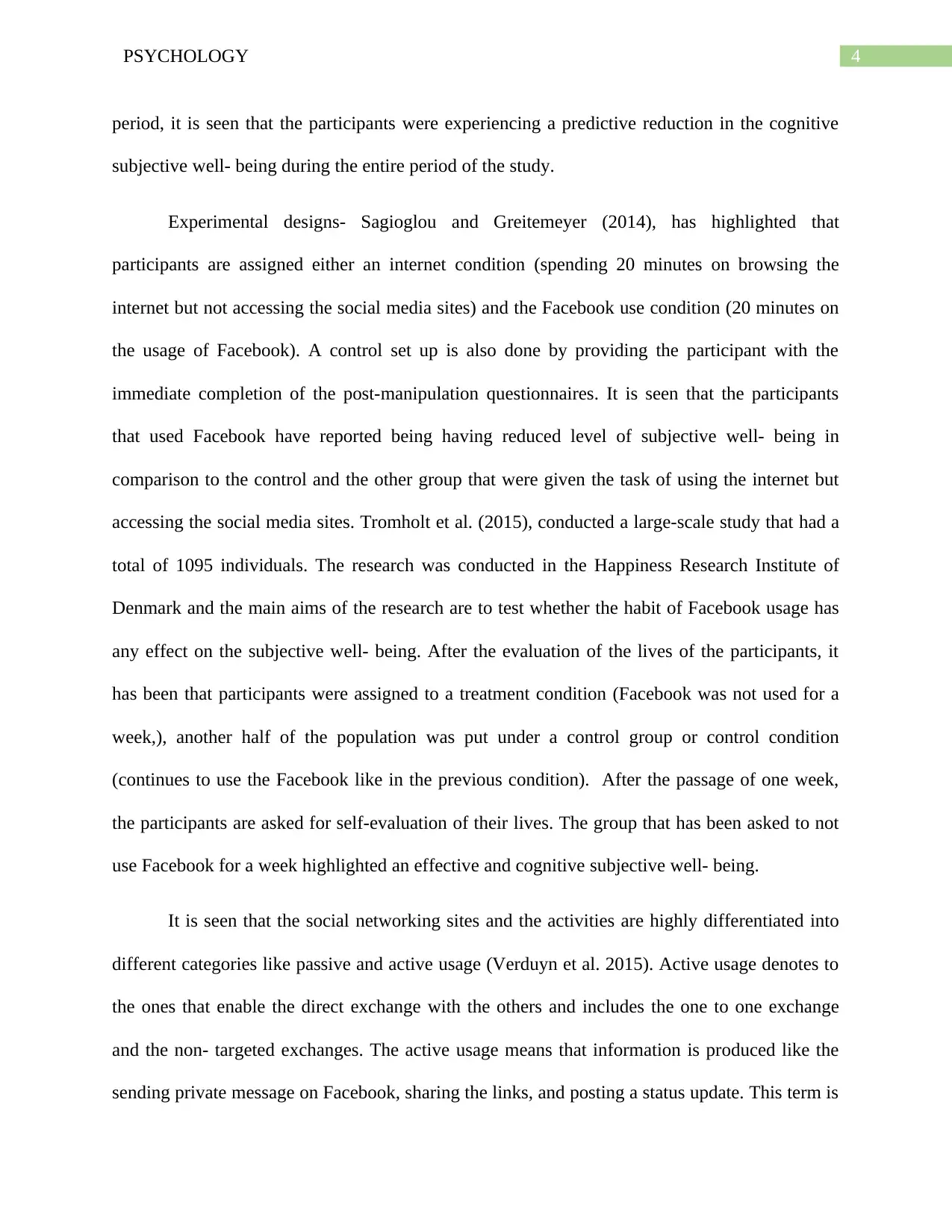
4PSYCHOLOGY
period, it is seen that the participants were experiencing a predictive reduction in the cognitive
subjective well- being during the entire period of the study.
Experimental designs- Sagioglou and Greitemeyer (2014), has highlighted that
participants are assigned either an internet condition (spending 20 minutes on browsing the
internet but not accessing the social media sites) and the Facebook use condition (20 minutes on
the usage of Facebook). A control set up is also done by providing the participant with the
immediate completion of the post-manipulation questionnaires. It is seen that the participants
that used Facebook have reported being having reduced level of subjective well- being in
comparison to the control and the other group that were given the task of using the internet but
accessing the social media sites. Tromholt et al. (2015), conducted a large-scale study that had a
total of 1095 individuals. The research was conducted in the Happiness Research Institute of
Denmark and the main aims of the research are to test whether the habit of Facebook usage has
any effect on the subjective well- being. After the evaluation of the lives of the participants, it
has been that participants were assigned to a treatment condition (Facebook was not used for a
week,), another half of the population was put under a control group or control condition
(continues to use the Facebook like in the previous condition). After the passage of one week,
the participants are asked for self-evaluation of their lives. The group that has been asked to not
use Facebook for a week highlighted an effective and cognitive subjective well- being.
It is seen that the social networking sites and the activities are highly differentiated into
different categories like passive and active usage (Verduyn et al. 2015). Active usage denotes to
the ones that enable the direct exchange with the others and includes the one to one exchange
and the non- targeted exchanges. The active usage means that information is produced like the
sending private message on Facebook, sharing the links, and posting a status update. This term is
period, it is seen that the participants were experiencing a predictive reduction in the cognitive
subjective well- being during the entire period of the study.
Experimental designs- Sagioglou and Greitemeyer (2014), has highlighted that
participants are assigned either an internet condition (spending 20 minutes on browsing the
internet but not accessing the social media sites) and the Facebook use condition (20 minutes on
the usage of Facebook). A control set up is also done by providing the participant with the
immediate completion of the post-manipulation questionnaires. It is seen that the participants
that used Facebook have reported being having reduced level of subjective well- being in
comparison to the control and the other group that were given the task of using the internet but
accessing the social media sites. Tromholt et al. (2015), conducted a large-scale study that had a
total of 1095 individuals. The research was conducted in the Happiness Research Institute of
Denmark and the main aims of the research are to test whether the habit of Facebook usage has
any effect on the subjective well- being. After the evaluation of the lives of the participants, it
has been that participants were assigned to a treatment condition (Facebook was not used for a
week,), another half of the population was put under a control group or control condition
(continues to use the Facebook like in the previous condition). After the passage of one week,
the participants are asked for self-evaluation of their lives. The group that has been asked to not
use Facebook for a week highlighted an effective and cognitive subjective well- being.
It is seen that the social networking sites and the activities are highly differentiated into
different categories like passive and active usage (Verduyn et al. 2015). Active usage denotes to
the ones that enable the direct exchange with the others and includes the one to one exchange
and the non- targeted exchanges. The active usage means that information is produced like the
sending private message on Facebook, sharing the links, and posting a status update. This term is
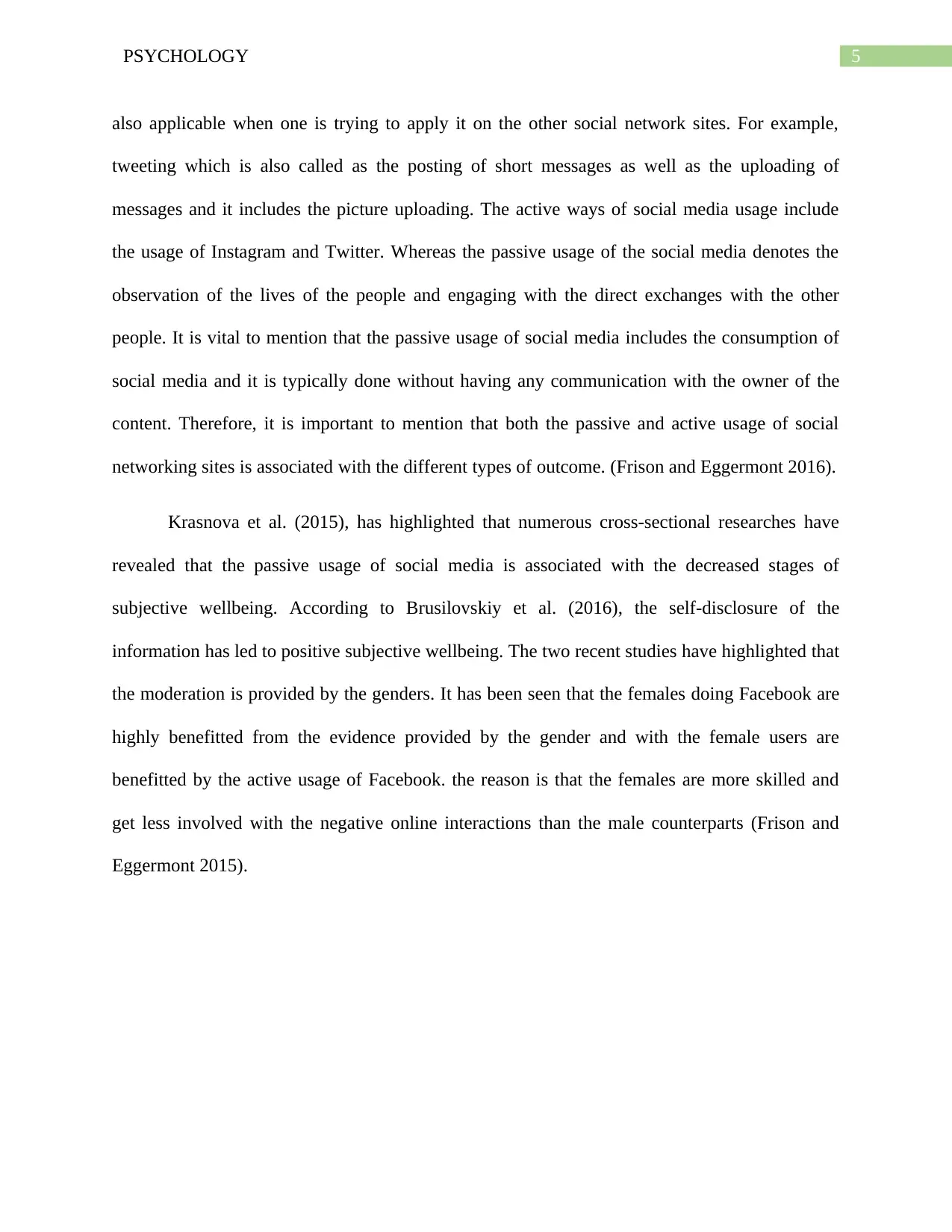
5PSYCHOLOGY
also applicable when one is trying to apply it on the other social network sites. For example,
tweeting which is also called as the posting of short messages as well as the uploading of
messages and it includes the picture uploading. The active ways of social media usage include
the usage of Instagram and Twitter. Whereas the passive usage of the social media denotes the
observation of the lives of the people and engaging with the direct exchanges with the other
people. It is vital to mention that the passive usage of social media includes the consumption of
social media and it is typically done without having any communication with the owner of the
content. Therefore, it is important to mention that both the passive and active usage of social
networking sites is associated with the different types of outcome. (Frison and Eggermont 2016).
Krasnova et al. (2015), has highlighted that numerous cross-sectional researches have
revealed that the passive usage of social media is associated with the decreased stages of
subjective wellbeing. According to Brusilovskiy et al. (2016), the self-disclosure of the
information has led to positive subjective wellbeing. The two recent studies have highlighted that
the moderation is provided by the genders. It has been seen that the females doing Facebook are
highly benefitted from the evidence provided by the gender and with the female users are
benefitted by the active usage of Facebook. the reason is that the females are more skilled and
get less involved with the negative online interactions than the male counterparts (Frison and
Eggermont 2015).
also applicable when one is trying to apply it on the other social network sites. For example,
tweeting which is also called as the posting of short messages as well as the uploading of
messages and it includes the picture uploading. The active ways of social media usage include
the usage of Instagram and Twitter. Whereas the passive usage of the social media denotes the
observation of the lives of the people and engaging with the direct exchanges with the other
people. It is vital to mention that the passive usage of social media includes the consumption of
social media and it is typically done without having any communication with the owner of the
content. Therefore, it is important to mention that both the passive and active usage of social
networking sites is associated with the different types of outcome. (Frison and Eggermont 2016).
Krasnova et al. (2015), has highlighted that numerous cross-sectional researches have
revealed that the passive usage of social media is associated with the decreased stages of
subjective wellbeing. According to Brusilovskiy et al. (2016), the self-disclosure of the
information has led to positive subjective wellbeing. The two recent studies have highlighted that
the moderation is provided by the genders. It has been seen that the females doing Facebook are
highly benefitted from the evidence provided by the gender and with the female users are
benefitted by the active usage of Facebook. the reason is that the females are more skilled and
get less involved with the negative online interactions than the male counterparts (Frison and
Eggermont 2015).
⊘ This is a preview!⊘
Do you want full access?
Subscribe today to unlock all pages.

Trusted by 1+ million students worldwide
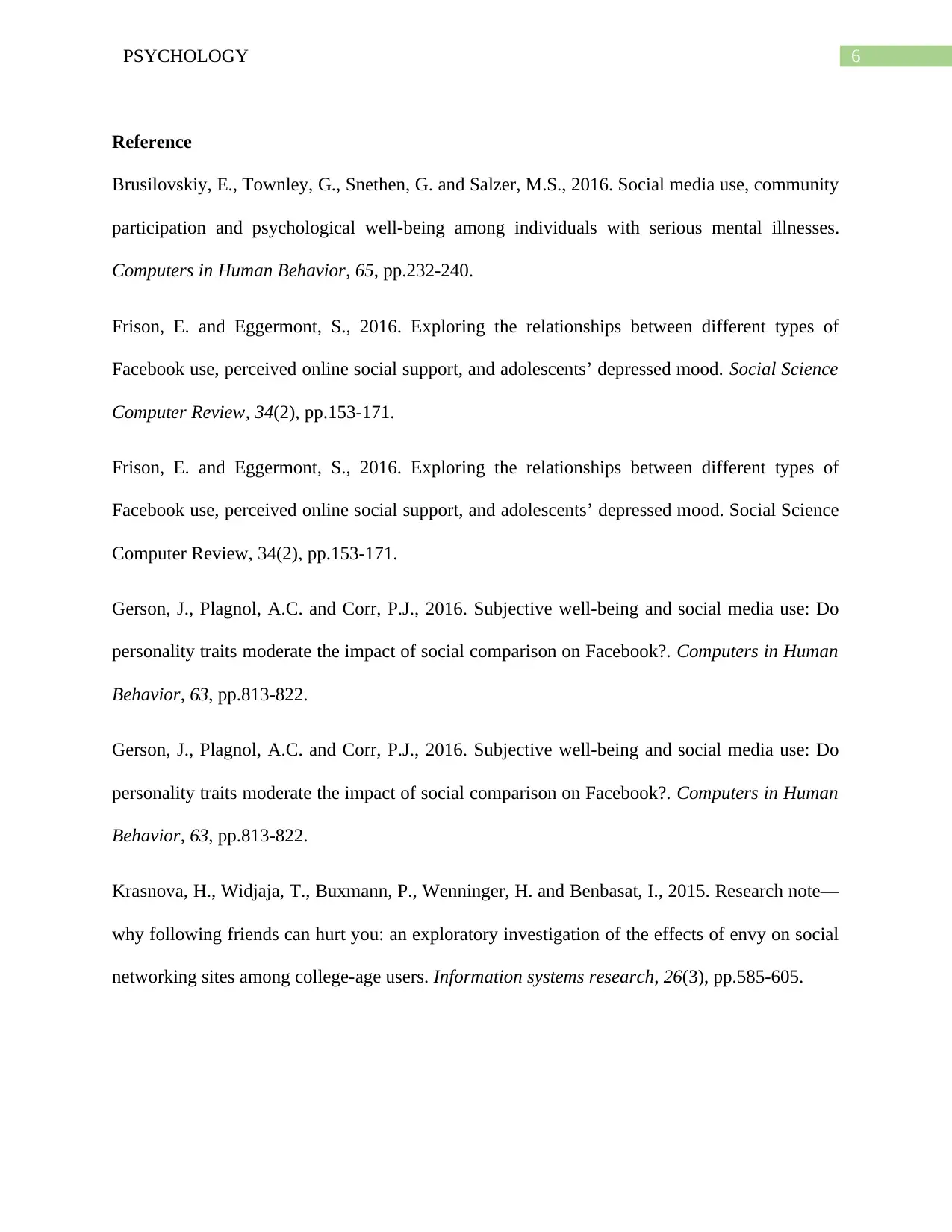
6PSYCHOLOGY
Reference
Brusilovskiy, E., Townley, G., Snethen, G. and Salzer, M.S., 2016. Social media use, community
participation and psychological well-being among individuals with serious mental illnesses.
Computers in Human Behavior, 65, pp.232-240.
Frison, E. and Eggermont, S., 2016. Exploring the relationships between different types of
Facebook use, perceived online social support, and adolescents’ depressed mood. Social Science
Computer Review, 34(2), pp.153-171.
Frison, E. and Eggermont, S., 2016. Exploring the relationships between different types of
Facebook use, perceived online social support, and adolescents’ depressed mood. Social Science
Computer Review, 34(2), pp.153-171.
Gerson, J., Plagnol, A.C. and Corr, P.J., 2016. Subjective well-being and social media use: Do
personality traits moderate the impact of social comparison on Facebook?. Computers in Human
Behavior, 63, pp.813-822.
Gerson, J., Plagnol, A.C. and Corr, P.J., 2016. Subjective well-being and social media use: Do
personality traits moderate the impact of social comparison on Facebook?. Computers in Human
Behavior, 63, pp.813-822.
Krasnova, H., Widjaja, T., Buxmann, P., Wenninger, H. and Benbasat, I., 2015. Research note—
why following friends can hurt you: an exploratory investigation of the effects of envy on social
networking sites among college-age users. Information systems research, 26(3), pp.585-605.
Reference
Brusilovskiy, E., Townley, G., Snethen, G. and Salzer, M.S., 2016. Social media use, community
participation and psychological well-being among individuals with serious mental illnesses.
Computers in Human Behavior, 65, pp.232-240.
Frison, E. and Eggermont, S., 2016. Exploring the relationships between different types of
Facebook use, perceived online social support, and adolescents’ depressed mood. Social Science
Computer Review, 34(2), pp.153-171.
Frison, E. and Eggermont, S., 2016. Exploring the relationships between different types of
Facebook use, perceived online social support, and adolescents’ depressed mood. Social Science
Computer Review, 34(2), pp.153-171.
Gerson, J., Plagnol, A.C. and Corr, P.J., 2016. Subjective well-being and social media use: Do
personality traits moderate the impact of social comparison on Facebook?. Computers in Human
Behavior, 63, pp.813-822.
Gerson, J., Plagnol, A.C. and Corr, P.J., 2016. Subjective well-being and social media use: Do
personality traits moderate the impact of social comparison on Facebook?. Computers in Human
Behavior, 63, pp.813-822.
Krasnova, H., Widjaja, T., Buxmann, P., Wenninger, H. and Benbasat, I., 2015. Research note—
why following friends can hurt you: an exploratory investigation of the effects of envy on social
networking sites among college-age users. Information systems research, 26(3), pp.585-605.
Paraphrase This Document
Need a fresh take? Get an instant paraphrase of this document with our AI Paraphraser
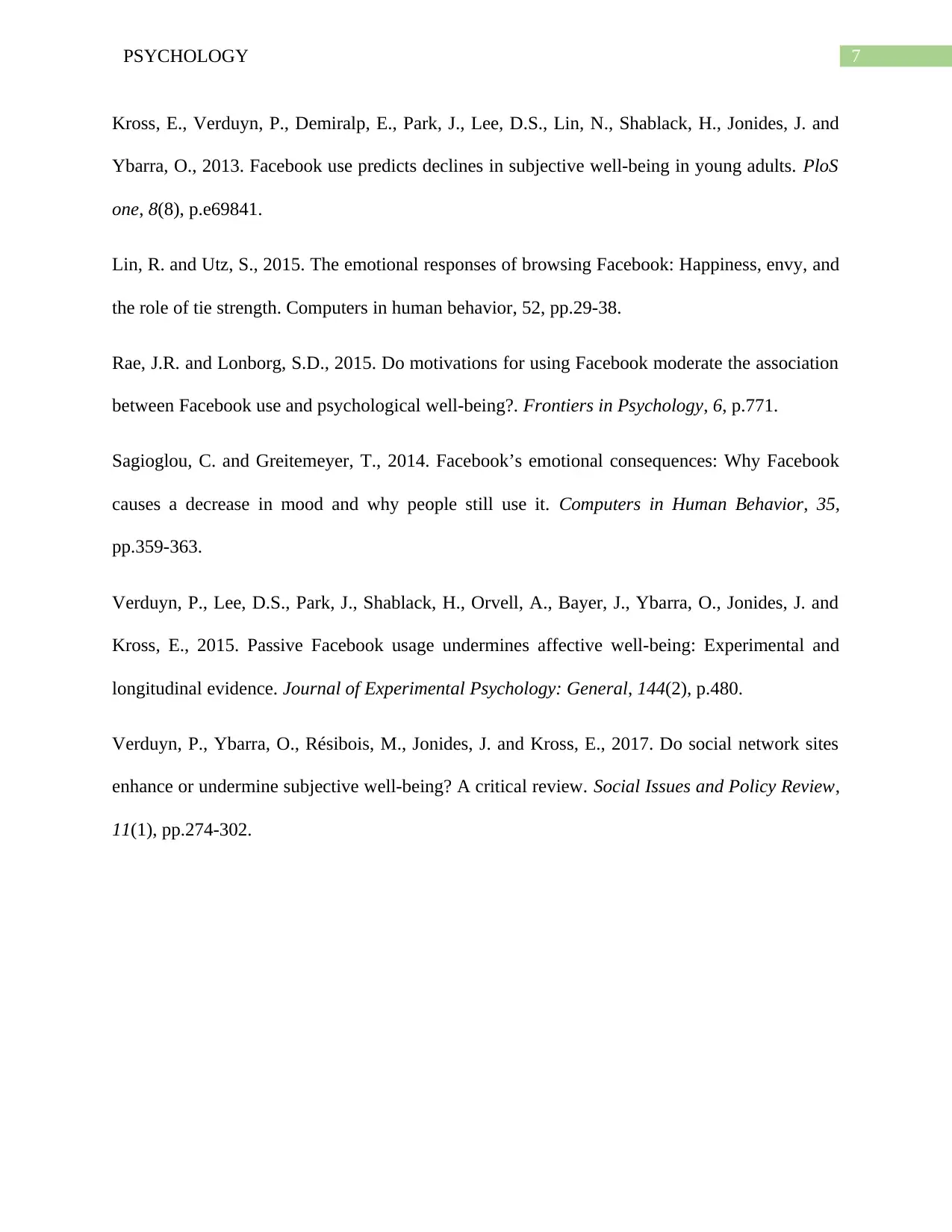
7PSYCHOLOGY
Kross, E., Verduyn, P., Demiralp, E., Park, J., Lee, D.S., Lin, N., Shablack, H., Jonides, J. and
Ybarra, O., 2013. Facebook use predicts declines in subjective well-being in young adults. PloS
one, 8(8), p.e69841.
Lin, R. and Utz, S., 2015. The emotional responses of browsing Facebook: Happiness, envy, and
the role of tie strength. Computers in human behavior, 52, pp.29-38.
Rae, J.R. and Lonborg, S.D., 2015. Do motivations for using Facebook moderate the association
between Facebook use and psychological well-being?. Frontiers in Psychology, 6, p.771.
Sagioglou, C. and Greitemeyer, T., 2014. Facebook’s emotional consequences: Why Facebook
causes a decrease in mood and why people still use it. Computers in Human Behavior, 35,
pp.359-363.
Verduyn, P., Lee, D.S., Park, J., Shablack, H., Orvell, A., Bayer, J., Ybarra, O., Jonides, J. and
Kross, E., 2015. Passive Facebook usage undermines affective well-being: Experimental and
longitudinal evidence. Journal of Experimental Psychology: General, 144(2), p.480.
Verduyn, P., Ybarra, O., Résibois, M., Jonides, J. and Kross, E., 2017. Do social network sites
enhance or undermine subjective well‐being? A critical review. Social Issues and Policy Review,
11(1), pp.274-302.
Kross, E., Verduyn, P., Demiralp, E., Park, J., Lee, D.S., Lin, N., Shablack, H., Jonides, J. and
Ybarra, O., 2013. Facebook use predicts declines in subjective well-being in young adults. PloS
one, 8(8), p.e69841.
Lin, R. and Utz, S., 2015. The emotional responses of browsing Facebook: Happiness, envy, and
the role of tie strength. Computers in human behavior, 52, pp.29-38.
Rae, J.R. and Lonborg, S.D., 2015. Do motivations for using Facebook moderate the association
between Facebook use and psychological well-being?. Frontiers in Psychology, 6, p.771.
Sagioglou, C. and Greitemeyer, T., 2014. Facebook’s emotional consequences: Why Facebook
causes a decrease in mood and why people still use it. Computers in Human Behavior, 35,
pp.359-363.
Verduyn, P., Lee, D.S., Park, J., Shablack, H., Orvell, A., Bayer, J., Ybarra, O., Jonides, J. and
Kross, E., 2015. Passive Facebook usage undermines affective well-being: Experimental and
longitudinal evidence. Journal of Experimental Psychology: General, 144(2), p.480.
Verduyn, P., Ybarra, O., Résibois, M., Jonides, J. and Kross, E., 2017. Do social network sites
enhance or undermine subjective well‐being? A critical review. Social Issues and Policy Review,
11(1), pp.274-302.
1 out of 8
Related Documents
Your All-in-One AI-Powered Toolkit for Academic Success.
+13062052269
info@desklib.com
Available 24*7 on WhatsApp / Email
![[object Object]](/_next/static/media/star-bottom.7253800d.svg)
Unlock your academic potential
Copyright © 2020–2026 A2Z Services. All Rights Reserved. Developed and managed by ZUCOL.





